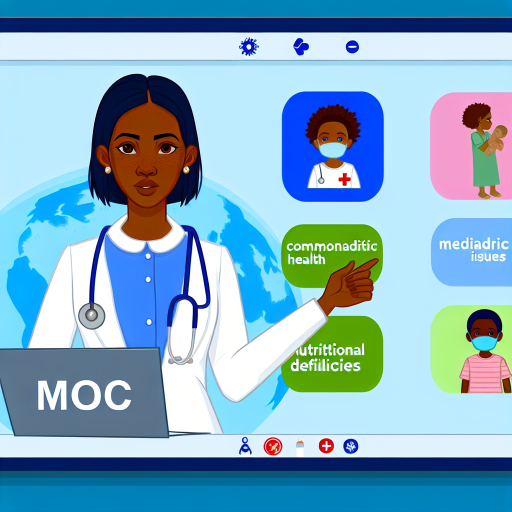Introduction
Studying parasitology is crucial in Nigeria for understanding and combating prevalent infectious diseases.
Parasitology plays a vital role in the country’s healthcare system by aiding in disease diagnosis and treatment.
Common parasites in Nigeria include malaria parasites, helminths like roundworms, and protozoa.
Parasitology Programs in Nigeria
Parasitology is a branch of science that studies parasites, their hosts, and the relationship between them.
In Nigeria, several universities offer parasitology programs at the undergraduate and postgraduate levels.
Availability of Parasitology Programs in Nigerian Institutions
Parasitology programs are available in various Nigerian universities. These institutions allow students to specialize in this field.
These programs equip students with knowledge about different types of parasites and their impact on human health.
Universities Offering Parasitology Courses
- University of Ibadan: The University of Ibadan offers parasitology courses as part of its medical programs.
- University of Lagos: The University of Lagos also has parasitology courses available for interested students.
- University of Nigeria, Nsukka: This institution offers parasitology courses in its Faculty of Biological Sciences.
- Ahmadu Bello University: Parasitology programs are available at Ahmadu Bello University in Zaria.
- Obafemi Awolowo University: This institution offers parasitology courses through its Faculty of Science.
Duration and Requirements for Studying Parasitology
Typically, undergraduate parasitology programs in Nigerian universities last four to five years, depending on the institution.
Students are required to have a strong background in biology, chemistry, and other related subjects.
For postgraduate studies in parasitology, students usually need a relevant bachelor’s degree in biology or a related field.
The duration of postgraduate programs varies from one to three years, depending on the level of study.
Students interested in studying parasitology in Nigerian universities should check the specific requirements of the institution they are applying to.
Some universities may require additional entrance exams or interviews for admission into parasitology programs.
Curriculum and Course Structure
When studying parasitology in Nigerian institutions, students can expect a diverse curriculum that covers various aspects of parasitic organisms.
Typical Courses Included in Parasitology Programs:
- Introduction to Parasitology
- Medical Parasitology
- Veterinary Parasitology
- Plant Parasitology
- Parasite Ecology and Epidemiology
- Molecular Parasitology
- Parasitic Protozoa
- Helminthology
- Immunoparasitology
- Parasitic Zoonoses
These courses provide students with a comprehensive understanding of different types of parasites and their interactions with hosts.
Practical Components of Studying Parasitology:
- Laboratory Techniques: Students learn to identify parasites using microscopic methods.
- Field Work: Students may participate in field studies to observe parasites in natural environments.
- Clinical Rotations: For medical parasitology students, clinical experience is essential for diagnosing parasitic infections.
- Research Projects: Students may conduct independent research on a specific aspect of parasitology.
These practical components enhance students’ hands-on skills and prepare them for real-world applications in parasitology.
Specialized Areas of Study within Parasitology:
- Vector Biology: Focuses on the insects or organisms that transmit parasites to hosts.
- Parasite Immunology: Explores the host immune response to parasitic infections.
- Parasite Genetics: Studies the genetic makeup and evolution of parasitic organisms.
- Parasite Control and Prevention: Strategies for managing and eradicating parasites in different settings.
These specialized areas allow students to delve deeper into specific aspects of parasitology that align with their interests and career goals.
Gain More Insights: Holistic Approaches in Medical Rehabilitation Nigeria
Research Opportunities in Parasitology
Studying parasitology in Nigeria opens up a world of research opportunities for students.
Research is crucial in advancing the field of parasitology in the country.
It leads to new discoveries and better understanding of parasitic diseases.
Here are some research opportunities available for students studying parasitology in Nigeria:
- Field Research: Students have the opportunity to conduct field research to study various parasites in their natural habitats.
- Laboratory Research: Students can also engage in laboratory research to conduct experiments, analyze samples, and identify parasites under the microscope.
- Collaborative Research: Students can collaborate with other researchers, both within Nigeria and internationally, to work on joint research projects.
Research plays a significant role in advancing parasitology in Nigeria.
It helps in the development of new diagnostic techniques, treatment methods, and preventive measures for parasitic diseases.
By conducting research, students contribute to the body of knowledge in parasitology and make meaningful contributions to public health.
Ongoing Research Projects in Parasitology
There are several ongoing research projects in parasitology in Nigeria that are making significant contributions to the field.
Some of the notable projects include:
- Study on Malaria: Researchers are conducting studies on malaria, one of the most prevalent parasitic diseases in Nigeria.
- Research on Schistosomiasis: Another area of focus is schistosomiasis, a parasitic disease transmitted through contaminated water.
- Investigation of Trypanosomiasis: Trypanosomiasis, also known as sleeping sickness, is another parasitic disease of concern.
These research projects are vital in enhancing our knowledge of parasitic diseases.
They improve diagnosis and treatment methods, ultimately reducing the burden of parasitic infections in Nigeria.
Students studying parasitology have the opportunity to get involved in these research endeavors.
They can contribute to the fight against parasitic diseases in the country.
Delve into the Subject: Medical Imaging Techniques Used in Nigeria
Internship and Fieldwork Opportunities
As a parasitology student in Nigeria, you will have various internship opportunities to gain practical experience in the field.
- Internship opportunities for parasitology students in Nigeria include placements in research laboratories, diagnostic centers, and public health facilities.
- These internships provide students with hands-on experience in parasite identification, sample collection, and data analysis.
- Interns also have the chance to work alongside experienced parasitologists and researchers, learning valuable skills and techniques.
Benefits of Gaining Practical Experience
Participating in fieldwork and internships as a parasitology student in Nigeria offers numerous benefits:
- Hands-on experience allows students to apply theoretical knowledge to real-world situations, enhancing their understanding of parasitology concepts.
- Fieldwork provides opportunities to develop practical skills such as microscopy techniques, sample processing, and laboratory safety protocols.
- Internships help students build professional networks and relationships with potential employers in the parasitology field.
- Practical experience gained during internships enhances students’ resumes and increases their chances of securing employment after graduation.
Collaborations with Healthcare Institutions
Many Nigerian institutions offering parasitology programs collaborate with healthcare institutions to provide students with hands-on experience:
- Collaboration with hospitals and public health facilities gives students the opportunity to work in clinical settings and gain practical experience in diagnosing and treating parasitic infections.
- Students may participate in field surveys and research projects conducted in collaboration with healthcare institutions, contributing to the advancement of parasitology knowledge.
- Working with healthcare professionals allows students to understand the practical applications of parasitology in patient care and disease prevention strategies.
Gain More Insights: Mental Health Impact of Nigeria’s Economic Struggles

Career Prospects for Parasitology Graduates
After completing a parasitology program in Nigeria, graduates have various career paths they can pursue.
These paths not only offer job opportunities but also contribute to the country’s healthcare sector.
Potential Career Paths for Graduates of Parasitology Programs
- Research Scientist: Graduates can work as research scientists focusing on parasitic diseases, conducting studies, and developing new treatments.
- Microbiologist: They can become microbiologists specializing in studying parasites and their effects on human health.
- Public Health Officer: Parasitology graduates can work in public health agencies, monitoring and controlling parasitic infections in communities.
- Parasitology Technician: Graduates can work as technicians in diagnostic laboratories, examining samples for parasitic infections.
- Medical Doctor: Some graduates choose to further their education and become medical doctors specializing in tropical medicine and infectious diseases.
Demand for Parasitologists in Nigeria’s Healthcare Sector
The demand for parasitologists in Nigeria’s healthcare sector is significant due to the prevalence of parasitic infections in the country.
Parasitologists play a crucial role in diagnosing, treating, and preventing these diseases.
Transform Your Career with Expert Guidance
Get personalized mentorship consulting that’s tailored to your unique path. Our expert advice is actionable and exclusive.
Get StartedWith tropical climates and limited access to clean water and sanitation facilities in certain regions, parasitic infections are a major public health concern.
Therefore, there is a constant need for skilled parasitologists who can address these challenges effectively.
Professional Organizations or Associations for Parasitologists
Joining professional organizations or associations can provide parasitology graduates with valuable networking opportunities, career development resources, and a platform to stay updated on the latest advancements in the field.
Some of the notable organizations for parasitologists in Nigeria include:
- Nigerian Society for Parasitology (NSP): NSP is a leading organization that promotes research and collaboration among parasitologists in Nigeria. They organize conferences, workshops, and training programs for members.
- West African Society for Parasitology (WASP): WASP is a regional organization that brings together parasitologists from West Africa to exchange knowledge and expertise. Membership offers access to international collaborations and research opportunities.
- Medical Laboratory Science Council of Nigeria (MLSCN): Although not specific to parasitologists, MLSCN is a regulatory body that oversees the practice of medical laboratory science in the country. Parasitologists can benefit from accreditation and certification offered by MLSCN.
By getting involved with these organizations, parasitology graduates can enhance their career prospects, stay informed about industry trends, and contribute to the advancement of parasitology in Nigeria.
Delve into the Subject: Funding for Microbiology Research in Nigeria
Challenges and Opportunities in Studying Parasitology in Nigeria
As with any field of study, students in Nigeria face several challenges when studying parasitology.
These challenges can hinder academic progress and overall learning experience.
However, there are also plenty of opportunities for growth and development in the field.
Let’s explore these challenges, opportunities, and ways to improve parasitology education in the country.
Challenges Faced by Students Studying Parasitology in Nigeria
- Inadequate funding for research and laboratory facilities
- Lack of up-to-date textbooks and research materials
- Shortage of qualified instructors and professors
- Inadequate infrastructure for fieldwork and practical training
- High student-to-faculty ratio leading to limited interaction
- Lack of awareness and appreciation for parasitology in society
These challenges can make it difficult for students to fully grasp the complex concepts and practical skills required in parasitology.
Without adequate resources and support, students may struggle to excel in their studies and pursue a career in the field.
Opportunities for Growth and Development in Parasitology
- Increasing demand for parasitologists in healthcare, research, and academia
- Opportunities for collaboration with international institutions and researchers
- Potential for advancements in diagnostics, treatment, and prevention of parasitic diseases
- Rising interest and investment in One Health approaches to address zoonotic diseases
- Possibility of securing grants and scholarships for research projects
- Potential for career advancement and specialization in various subfields of parasitology
Despite the challenges, there are numerous opportunities for students studying parasitology in Nigeria to make significant contributions to the field.
By leveraging these opportunities, students can enhance their knowledge, skills, and professional network to succeed in their academic and professional careers.
Ways to Improve Parasitology Education in Nigeria
- Enhance funding for research grants, scholarships, and infrastructure
- Update curriculum with current trends, research findings, and practical skills
- Recruit and retain qualified instructors and mentors in parasitology
- Establish partnerships with industry, government agencies, and non-profit organizations
- Encourage interdisciplinary collaboration and research across different fields
- Organize workshops, seminars, and conferences to promote awareness and knowledge sharing
By implementing these strategies, educational institutions in Nigeria can improve the quality of parasitology education.
They can attract talented students and researchers, and contribute to the overall growth and development of the field.
With the right support and resources, students can overcome challenges and seize opportunities to excel in parasitology.
Importance of Parasitology in Public Health
Studying Parasitology in Nigerian institutions offers a robust foundation in understanding parasitic diseases.
It provides valuable insights into the prevention and treatment of these diseases.
Pursuing a career in parasitology in Nigeria is essential for the advancement of public health and medical research.
Aspiring students passionate about parasitology should not hesitate to explore this field.
They can contribute to the improvement of healthcare practices in the country.




